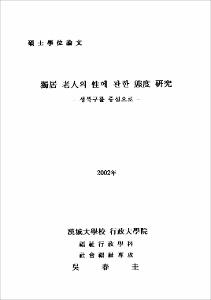獨居 老人의 性에 관한 態度 硏究
= (A)study on the sexual attitudes of the elderly living alone : focused on those elderly living at Seongbuk-gu, Seoul
- Type
- Thesis
- Alternative Title
- 성북구를 중심으로
- Department
- 福祉行政學科社會福祉專攻
- Issued Date
- 2002
- Publisher
- 漢城大學校 行政大學院
- Files in This Item:
-
-
Download
 000000066101.pdf
기타 데이터 / 3.19 MB / Adobe PDF
000000066101.pdf
기타 데이터 / 3.19 MB / Adobe PDF
-
Items in Repository are protected by copyright, with all rights reserved, unless otherwise indicated.